Consolidated Catalina JX208, Castlegregory, Kerry, 1944
As the second world war ground its way toward its painful end, the Squadrons of the Royal Air Force's Coastal Command continued the missions they had carried out for five long years. The aircraft of Coastal Command had figured more often than not in the events that encompassed the tale of wartime Belligerent aircraft landings in and around Ireland. Of the final four fatal wartime crashes, the two most deadly were of Coastal Command aircraft. Sunderland ML743 crashed in February 1945, and it's story is told here on the site.
On the night of the 20th of December 1944, the penultimate Coastal Command loss in Ireland occurred, resulting in the death of nine airmen of 202 Squadron. RAF, occurred on the slopes of Benoskee Mountain above the seaside town of Castlegregory on the Dingle Peninsula. Witness on the night, including Jeremiah Dowling, Thomas Kelleher, Edward Rohan and his son his son Patrick, provided statements two days after the crash that they had heard an aircraft flying particularly low at about 2 am on the morning of the 20th of December. They were familiar with hearing aircraft flying around probably due to previous wartime time traffic and proximity to the Foynes flying boat base. They and others on this occasion were concerned that the aircraft was flying so low that it might indeed crash into the village of Stradbally. The aircraft passed over head however and moments later the engine noise ceased and an explosion produced a glaring fireball that lit up the surrounding area, in the words of Edward Rohan - ‘As soon as it crashed it went on fire immediately and you could pick a pin in my front yard with the light’. Each of the three older men lived no more than one and a half miles from the crash scene. Rohan and Kelleher lived in ‘Goulane’ per their witness statements, this is a townland on the northern side of Benoskee Mountain. The crash was recorded as being on the land of Timothy Lynch, Knockacorrin, Stradbally.
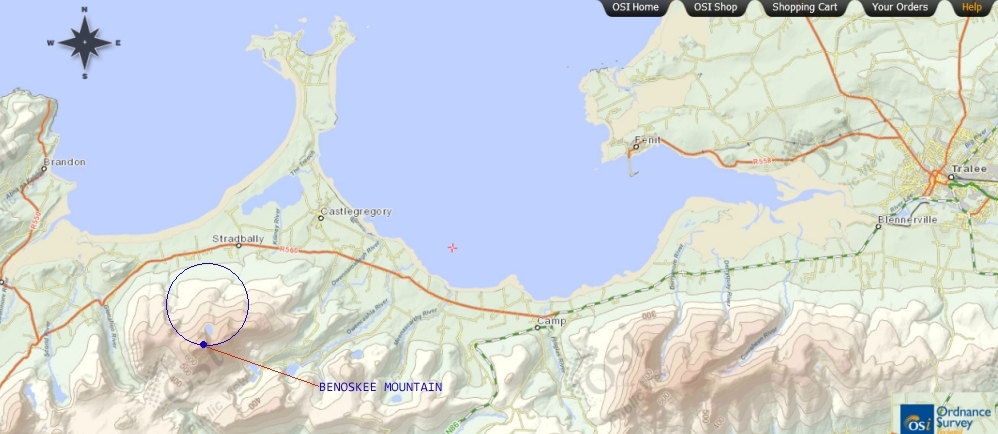
The peak of Benoskee Mountain is highlighted in the map above and the circle indicates the possible crash locations but this needs to be confirmed.
A party of Gardai under Sgt. D F O’Connell from the station in
Castlegregory made their way to the scene arriving at about 5
am. Locals were at the scene and it was 8 am before a party of
the Military from Tralee arrived to take over the area from the
police, L.S.F. and L.D.F. Members of the local Red Cross were
also present at the scene. The military party that attended the
scene came from the 15th Infantry Battalion based in Tralee.
Major M J Leamy from that unit submitted a report dated the 28th
of December 1944 and it is worth quoting from that in summary:
Sir,
I have the honour to submit the following report on
the crash of R.A.F. Catalina which crashed about 2 miles
South of the village of Stradbally, Castlegregory, Co.
Kerry, at 03:00 hours on 20.12.1944.
The nine occupants of the craft were killed and were
all badly burned with the exception of Flight-Sergt,
Williams. With difficulty all were identified and the
following is a list of the occupants:
Pilot 114373. Fl/Lt. Langton, Anthony Basil.
2nd. Do. 1586500. Fl/Sgt. Williams, E
Nav. 1322824. Sergt. Lowe, P. L.
F.M.E. 166665. do Cuthbert, G. A.
F.E. 914922. Fl/Sgt. Perkins, I R.
Wom/A.G. 1484496. do Wotherspoon, R.
V.O.r/A.G. 1397870. do Durrant, R.F.
- 1394808. do Aldrich H.G.
- - - Lewis, A.R.
The craft went on fire and the petrol tanks must have
burst as an area of about 150 yds. Long by 50 yds. Wide
showed evidence of burning. There must have been a
considerable amount of petrol in the tanks to spread over
the area. The only portion of the craft not burned were a
small portion of the tail and wings. The portion which went
on fire must have burned fiercely as all the metal parts had
melted.
A military party under Major M.J.Leamy arrived at the
scene of the crash at 08.00 hours and took over from the
Guards and the L.D.F. who were then at the scene. Lieut.
Hennessy, Lieut. O’Shea and Lieut. Keohane were among the
military party.
On examination of the scene four depth charges were
discovered and a quantity of S.A.A. of .50 and .303 calibre.
All .50 ammo. Had been blown with the heat and what remained
of the .303 was collected together and later handed over to
Lieut. Cusack, Air Force, Rineanna. Captain Pringle, A.O.C.,
disposed of the depth charges by exploding them. The
following list gives what was found in the line of armament:
Vickers .303 in. Guns 2. Serial Nos. a12415 &
A7013
Browning .50 2.
Verey Light pistols 1.
1 Case of Smoke Floats containing 9 floats.
1 Box of Radio Equipment.
Above were collected by Lieut. Cusack, Air Force,
Rineanna.
It appears that the crash took place during a heavy
shower. According to Thomas Rohan of Stradbally (and his
brother Patrick) the plane was flying in a southerly
direction and flew very low over Stradbally village. They
formed the opinion that she was in trouble and would crash.
They got up as they were afraid she might crash on the
village. They next heard the explosion of the crash and saw
the plane go on fire. They rushed to the scene and arrived
there about 03.28 hrs. There were some persons there ahead
of them including Jeremiah Dowling, Stradbally, Edmund
Rohan, Stradbally, Patrick O’Shea, John Joe O’Shea. The
plane was still burning fiercely but they were able to get
Flight-Sergeant Williams clear of the wreck. He was dead but
was anointed by Fr. Browne of Castlegregory.
All the bodies were removed to an out-house the
property of Mr. Timothy Lynch, Stradbally, Castlegregory,
where they were removed from at 02:00 hours on the 21st.
instant to Ballymullen Barracks, Tralee. They were removed
to Baldonnel with escort under Lieut. Hennessy and handed
over at 14:45 hours on the 21st instant.
All personal effects were listed and handed over in
sealed packets and a receipt obtained.
The Catalina was operating from Castle-Archdale on the
Erne and it would appear that is was on a 24 hours patrol
from 19:00 hrs. on 19.12.1944 to 19.00 hrs, on the
20.12.1944 from documents received. The fact of having four
depth charges indicated that it was on an anti-submarine
patrol and documents and the area would most likely be the
Bay of Biscay. The cause of the crash would appear to be
that the plane was in trouble and flying low and that the
pilot and navigator thought they were over the sea. The
crash occurred at about 1,000 feet altitude at point
145-110.
The following documents have been forwarded to G2,
Southern Command: Diagram of Catalina (Charred).
Documents giving particulars of Submarines.
Antenna Tuning Chart A.T.B.
Three pieces of charts of Erne.
One degree scale in case.
Map of Ireland
Navigation Tables.
Astronomical Tables
The Air Almanac, 1944 Sept. to Dec.
Note Book.
I have the honour to be,
Sir
Your obedient servant
J Hennessy Lieut, For Major,
W. J. Leamy
The remains of the men were taken from County Kerry on the 21st of December and driven by a men and trucks from the 1st Division to Baldonnel aerodrome outside Dublin. There they were transferred to fresh vehicles and with flags at the airfield at half mast, they departed for the border. 2nd/Lieut. T.J. Guy of the Irish Air Corps Transport Section, accompanied the remains to the border at Carrickarnon. There, a Guard of Honour under Capt. Fitzgerald from Dundalk Military Barracks awaited. The remains were transferred to an RAF officer that evening.
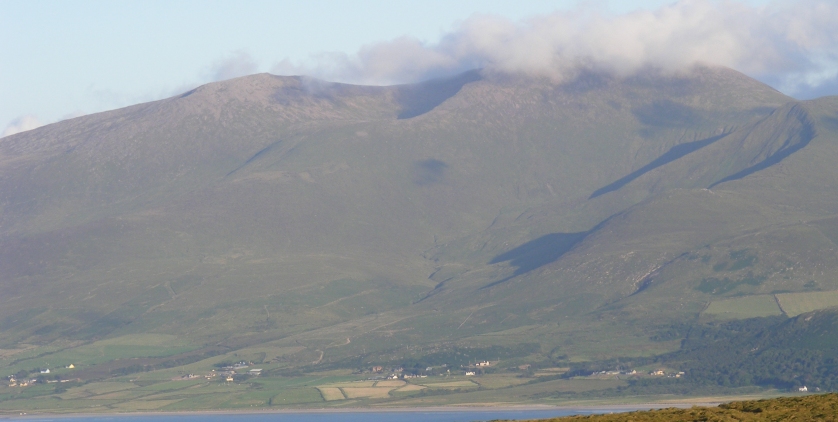
The photo above of Stradbally and Benoskee mountain was taken in 2008 from the tip of Brandon Point to the north west. The town of Stradbally is just out of view to the left of the photo but the crash site should probably be located on the center left of the image. The noticeable hollow in the top of the mountain contains a lake.
The names and family details of the men from the crashed
Catalina can be found in the records of the Commonwealth War
Graves Commission and it is from this source that relatives of
the crew members were traced in 2012-2015
F/Lt Antony Basil LANGTON 114373
Pilot 27 years
Son of Ernest Charles Langton and Elsie Langton, of Fairacre,
Fishbourne on the Isle of Wight, he is buried in the church yard
of St Olave's Church with his father who predeceased him in
1929. His headstone gives his date of birth as 1908 but civil
birth records record his birth was registered in 1918, and he is
not found with his parents on the 1911 census.
At the start of the war he was a 2nd Lieutenant in the Royal
Artillery before transferring to the RAFVR in 1942.
The family of F/Lt John Howard Dunn, confirmed that their father
was the regular second pilot for F/Lt Langton but had been
posted away to 131 OTU in order to himself become an aircraft
Captain. Thus he always told how he had survived the loss of his
crew.
A December 1944 newspaper cutting describes him as"youngest and
beloved son of Elsie Langton of Fishbourne, I.W."
Various records spell his name as Antony or Anthony.
F/Sgt Eric WILLIAMS 1586500
Pilot Aged 23 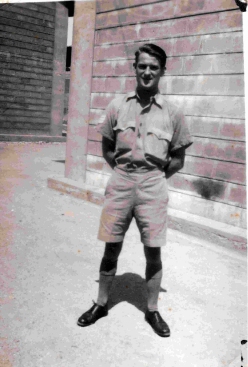
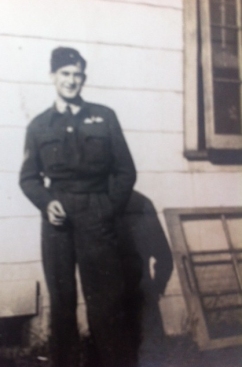
Son of Frederick John and Dorothy Williams, of Devonport. Eric
is buried in Plymouth. His sister Ann who was only 8 at the time
that he died provided the above photo of Eric. Eric is not in
the above photo as of the two pilots in the photo, the one
sitting is F/Lt John Howard Dunn of the RAF. F/Lt Dunn's family
understand that this photo was taken in around April 1944 at
about the time their father joined 202 Squadron.
F/Sgt Peter Lloyd LOWE 1322824
Navigator/Bomber aged 21 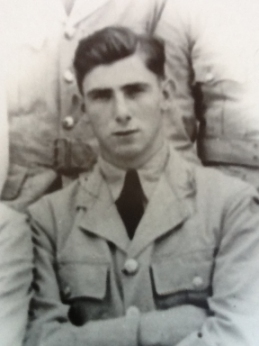 Son of Leonard William and Nelly Lowe, of
Outwood, see below for further details of Peter.
Son of Leonard William and Nelly Lowe, of
Outwood, see below for further details of Peter. 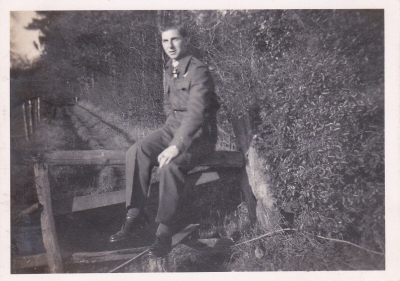
The photo at right was taken during one of Peter's last leave
visits to his parents.
P/O Robert Raymond PERKINS 196829
Flight Engineer aged 25 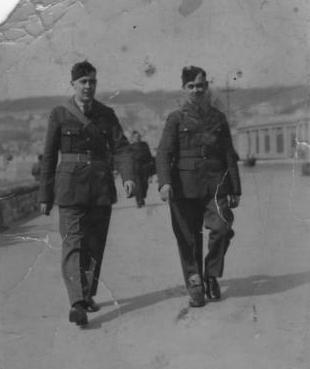 Son of Robert James Perkins
and Minnie Perkins, of Basingstoke. Robert was commissioned as
an officer around the time of the crash and the notice of
promotion was published posthumously in the London Gazette in
1945. His nephew was able to confirm that he was among the
airmen photographed above and provided the photo shown at right
which is believed to have been taken in Weston-super-mare,
Robert is seen on the left of the photo. Before the war he was a
technician with Kelvin Hughes Instruments in Basingstoke. His
family understand that he had completed tours of duty with RAF
Bomber Command. His service number at enlistment was 914922
indicating an early enlistment in perhaps 1939 or 1940.
Son of Robert James Perkins
and Minnie Perkins, of Basingstoke. Robert was commissioned as
an officer around the time of the crash and the notice of
promotion was published posthumously in the London Gazette in
1945. His nephew was able to confirm that he was among the
airmen photographed above and provided the photo shown at right
which is believed to have been taken in Weston-super-mare,
Robert is seen on the left of the photo. Before the war he was a
technician with Kelvin Hughes Instruments in Basingstoke. His
family understand that he had completed tours of duty with RAF
Bomber Command. His service number at enlistment was 914922
indicating an early enlistment in perhaps 1939 or 1940.
Sgt George Alfred CUTHBERT 1666665
Air Gunner aged 21 Son of George Alfred and Mary Hanah Cuthbert,
of Euston, London. His remains were not returned to England and
lie at rest in Irvinestown cemetery in Northern Ireland.
Sgt James Malcolm WOTHERSPOON 1494496
Wireless Operator/Air Gunner, aged 22, 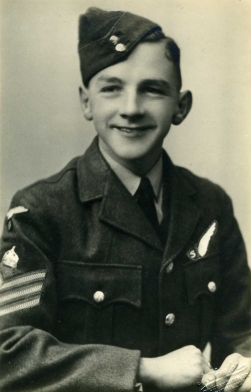 son of James A. Wotherspoon and Annie
Wotherspoon, of Burnley. James was the youngest of three
brothers. James was listed in the 1939 register as an Articled
Pupil to an architect. All three joined the RAF during the war,
Robert spending much of the war in Canada in a training role
while John Wotherspoon became a POW when his Whitley bomber was
shot down while taking part in Operation Colossus, the first
British parachute raid of the war.
son of James A. Wotherspoon and Annie
Wotherspoon, of Burnley. James was the youngest of three
brothers. James was listed in the 1939 register as an Articled
Pupil to an architect. All three joined the RAF during the war,
Robert spending much of the war in Canada in a training role
while John Wotherspoon became a POW when his Whitley bomber was
shot down while taking part in Operation Colossus, the first
British parachute raid of the war.
James is buried with his parents in Burnley. 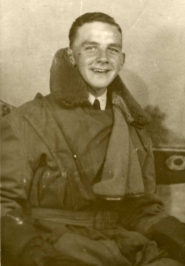
Sgt Reginald Frank DAMANT 1397870
Wireless Operator (Air) Aged 20 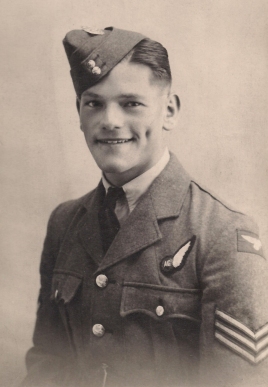 Son of Frank and Alice Mary Damant, of Ipswich.
Reginald was recognised in the group photos by his sister after
this site was tracked down by her daughter. His sister, a
wartime member of the Women's Auxilliary Air Force (WAAF), had
become engaged only two days before her brothers crash. His
sister recalls him as having a love of aviation and that he may
have served with Bomber Command before his posting to Coastal
Command.
Son of Frank and Alice Mary Damant, of Ipswich.
Reginald was recognised in the group photos by his sister after
this site was tracked down by her daughter. His sister, a
wartime member of the Women's Auxilliary Air Force (WAAF), had
become engaged only two days before her brothers crash. His
sister recalls him as having a love of aviation and that he may
have served with Bomber Command before his posting to Coastal
Command.
Sgt Henry George ALDRICH 1294808
Wireless Operator (Air) Aged 33
Son of Henry Herbert and Beatrice Constance Aldrich from
Ruislip; husband of Eileen Marie Aldrich, of Blackfen, Sidcup,
Kent
Sgt Albert Raymond LEWIS 2204497
Air Gunner Aged 19
Son of John Thomas and Emily Lewis, of Whitefield, Greater
Manchester. Albert was one of nine children and his last
sibling, his brother Glynn passed away in 2014. He kept
his brothers last letter up until his death. Albert's
nieces hope to be able to provide some more details of his short
life.
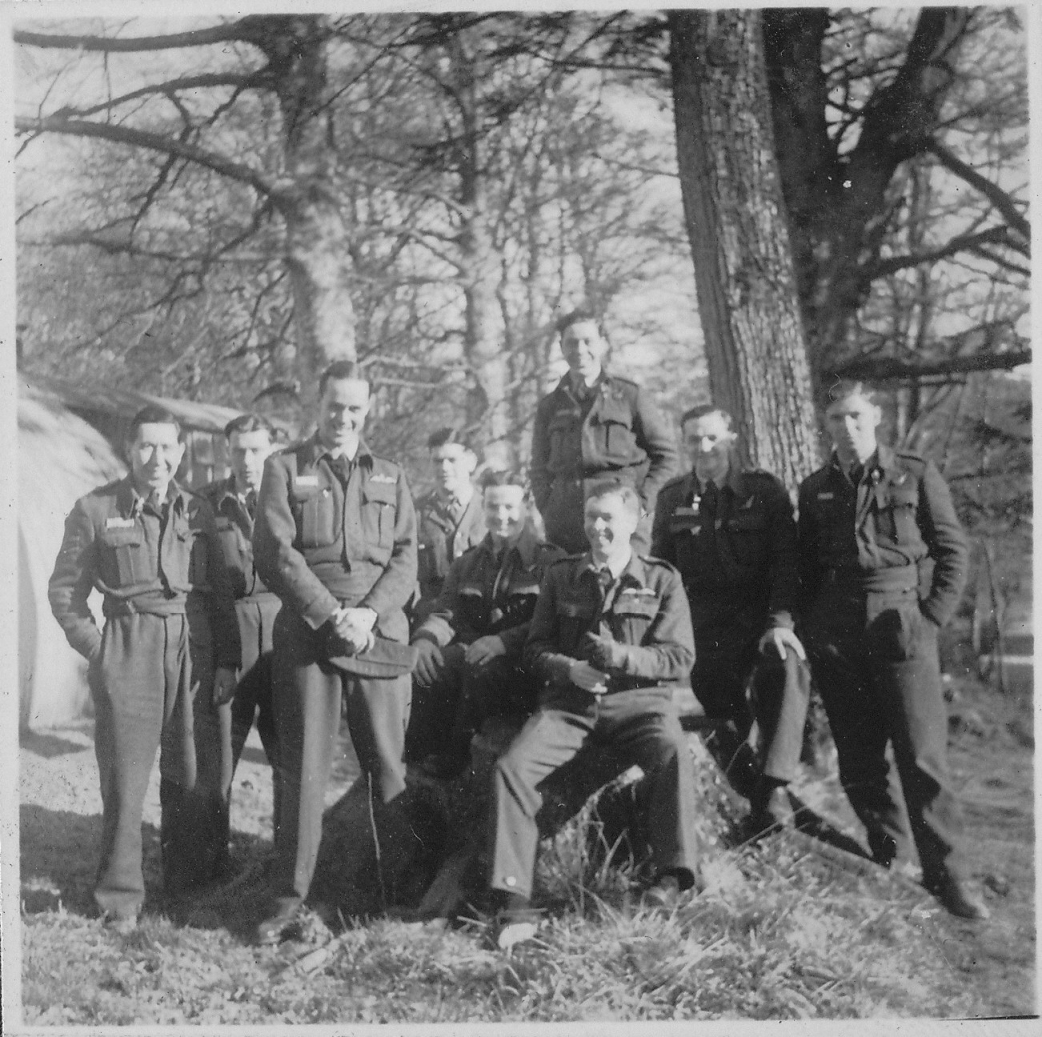
The photo above was supplied by the family of Peter Lowe, the
navigator of the aircraft. The family of the man seated at the
front with pilots wings confirm that he is F/Lt John Howard
Dunn, the co pilot for A B Langton from April 1944 to September
of that year. The sister of Eric William's understandably could
not recognise her brother in the photo.
While the names of those in the photo are not known for certain,
Peter Lowe is the man standing at the far right of the photo.
The two men at the front of the photo have pilot wings badges,
while all other men appear to have the single wing badge of
navigators, radio operators etc.
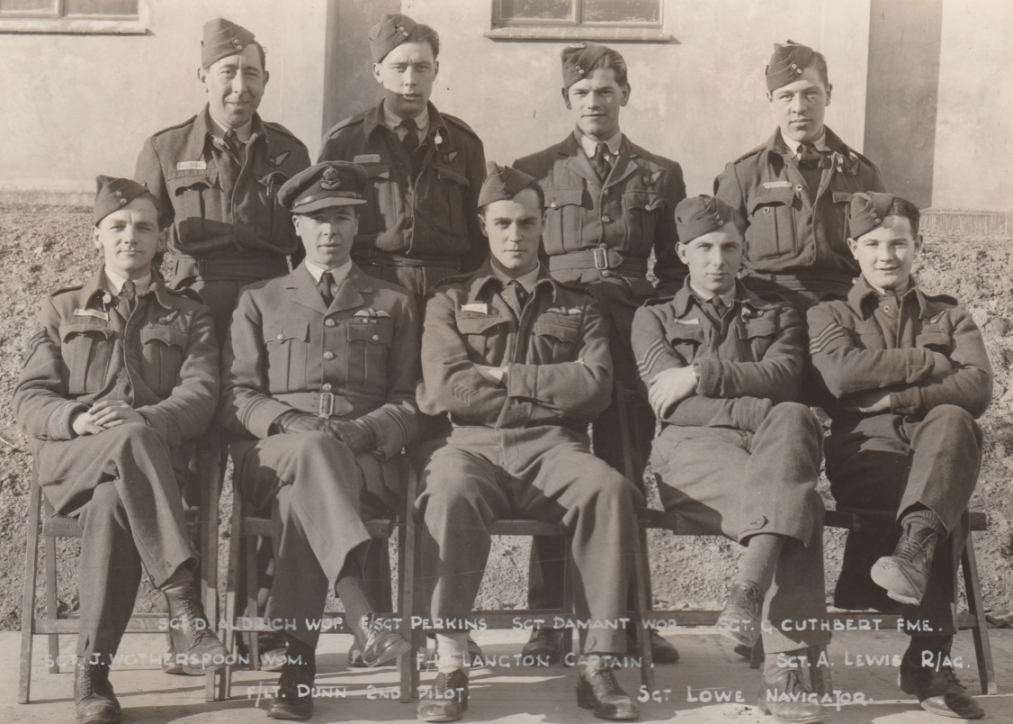
The second photo, above, was provided by the nephew of J M
Wotherspoon. This wonderful photo clearly names all the men and
was also in the possession of the family of F/Lt Dunn albiet
without the names recorded. To aid in reading the names are
transcribed here:
Back Row, Left to Right: Aldrich, Perkins, Damant,
Cuthbert;
Front row Left to Right:Wotherspoon, Dunn, Langton, Lowe,
Lewis
Peter Lowe was a 21 year old Flight Sergeant. His trade recorded on his Commonwealth War Graves entry is that of Navigator/Bomber (Nav/Bom). He was the son of Leonard William and Nelly Lowe from Outwood in Surrey, just to the east of the modern M23 motorway south of London. The photos below come from Peter's belongings. They appear to show him in a slightly warmer climate than Northern Ireland. It is explained that his belongings indicate that he served in Rhodesia and probably trained at a training unit there.
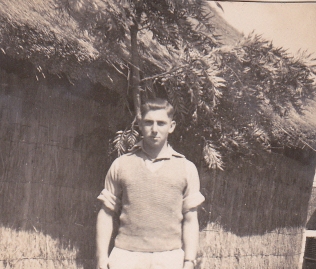 |
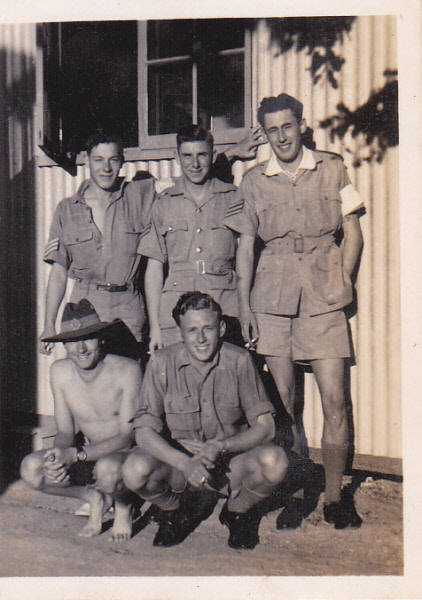 |
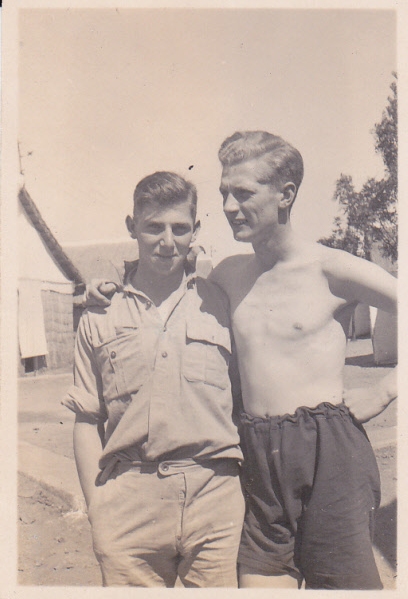 |
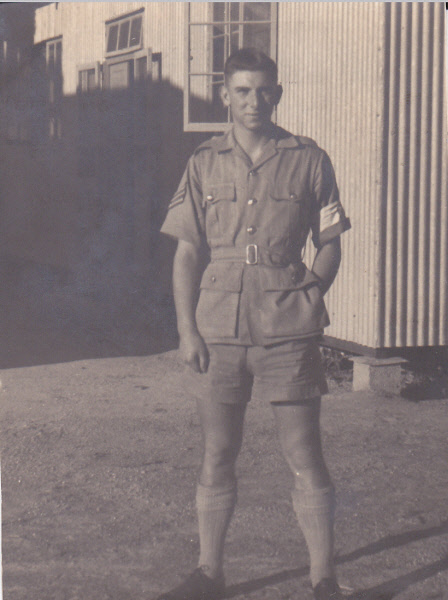 |
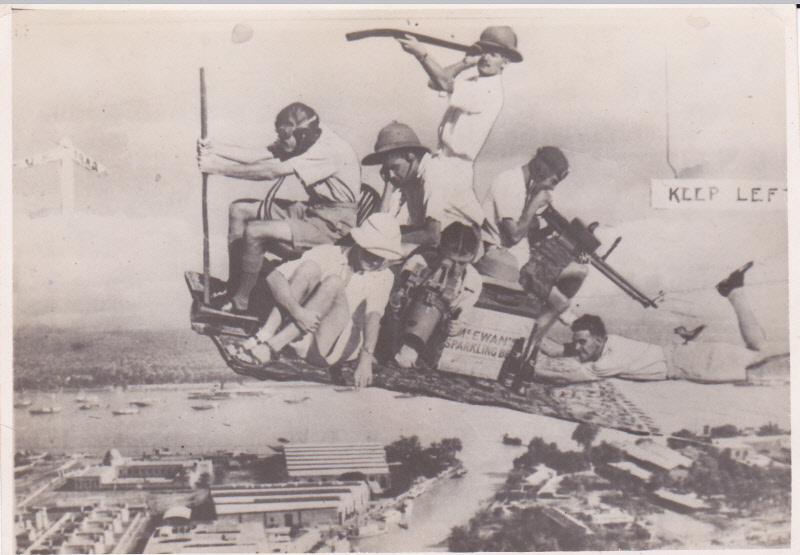
This particular photo above from Peter Lowe's belongings shows
some airmen mucking around. The Middle Eastern influences and
the pith helmets suggest that this may have been taken in
Gibraltar. The background image would suggest again though that
it was somewhere in Africa perhaps. The sign post on the left of
the image points to Iraq on one of the arms
The wartime Operations Record Books for 202 Squadron, retained
in the United Kingdom national Archives in Kew London under
reference AIR27/1185 can be used to trace the last few months
service of F/Lt Langton and his crew. The first operational
mission for F/Lt Langton and his crew was on 29th June, 1944
from Gibralter. The crew was that which died in December with
two differences. F/Lt Dunn was of course the Co-pilot and there
is a Sgt H Rudkin flying as a tenth crew member. Fl'lt Dunn's
log book shows that he continued to fly with Langton up to the
28th of August after which he transferred back to Northern
Ireland. From at least as far back as September 1944 the nine
men who died on JX208 flew as crew together out of Gibraltar and
later from Lough Erne.
The monthly summary in the ORB reads for September 1944:
The Squadron after operating
continuously in Gibraltar from 11th September, 1939 having
arrived from Malta the previous day, was transferred on the
3rd September to Castle Archdale, N. Ireland. The move was
accomplished with great speed and without any mishap, the
first 2 aircraft leaving within 4 days of the receipt of the
movement order, those that remained left the following day.
The ground crew and squadron equipment traveled by the sea
route reaching Castle Archdale on the 19th of the month. The
change over from A.S.V Mk II to A.S.V. Mk VIII continued and
during the month aircraft were flown to Felixstowe for this
purpose. A small detachment of aircraft remained at Sullom
Voe where F/L Bishop in Y/202 attacked a U/boat using
Schnorkel in posn. 63.38N 0725W but from the evidence
available it was not known whether the U/boat suffered an
damage.
Indeed, from the ORB, it appears that F/Lt Langton and his crew
were one of three aircraft to depart for Felixstowe on the 5th
of September along with aircraft flown by F/Lt Edgar and Sqd/Ldr
Inglis. On the 6th of September F/Lt Langton is found to be
flying Catalina T/202 from Woodhaven to Castle Archdale.
Aircraft P/202 that he flew to Felixstowe from Gibraltar does
not appear in the ORB for that month and in any case, the ORB
does not identify the aircraft by their serial numbers.
Woodhaven was a flying boat base in Fife, Scotland. The same
entry appears in the ORB for 26th September, again with aircraft
T, perhaps this is an error in the ORB or simply by the nature
of the entries, the location of aircraft and crews all over
Europe might have resulted in confusion. 


For the month of October, there is no mention at all of the
Langton crew. They may have spent the month perhaps on leave
with their aircraft being modified in Felixstowe. Or they may
have been undergoing training with the aircraft and new
equipment.
During the month of November 1944, the only mention of the crew
is implied in these two summary entries, not recorded in detail
as they were non-operational ferry flights. The The ORB explains
that the Catalina aircraft were being sent to Felixstowe to be
fitted with ASV Mk. VIIIA radar and the resulting training on
that. The ORB does not seem to record training flights which may
have been carried out locally off the coast of Donegal. Further
training was being carried out on using the Leigh Light
equipment. During November the unit had 15 Catalina aircraft and
242 members of aircrew.

![]()
The ORB for December contains just these three mentions of the Langton crew, one mission of just over 11 hours duration on the 12th of December and their final fatal mission, taking off late on December 19th and crashing shortly after in Kerry.




The complete destruction of JX208 in its crash in neutral
territory and the death of its entire crew left little that
could be used to determine the cause of the crash. What
investigations that could be carried out resulted in the limited
entries to be found on the Air Ministry crash form held in the
archives of the Royal Air Force Museum in Hendon, London.
Despite the fire after the crash, the military and police at the
scene were able to report that the tail of the plane was painted
with the serial '1208' or 'JK208'.
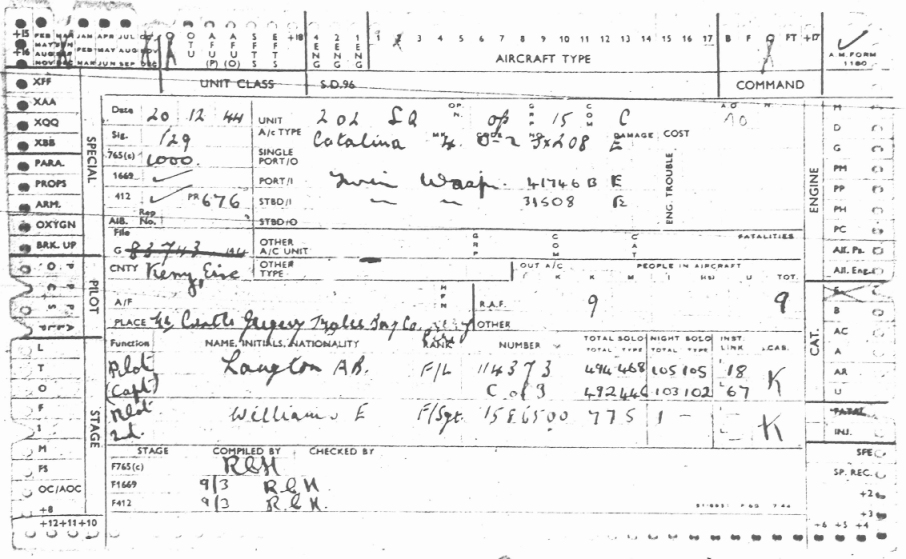
One side of the form provides the basic details of the aircraft
and flight crew. The aircraft was built in the US by the
Consolidated company at San Diego, California and was in RAF
terms a Catalina IVA. This was a non amphibious version of the
aircraft and would have operated from water only. Flying hours
for the two pilots flying, F/Lt Langton and F/Sgt E Williams are
provided and indicate that both were experienced pilots, Langton
with 600 hours flying and Williams with perhaps 775 hours in
total. Indications on the sheet are that RAF courts of enquiry
were carried out and Forms 765 and 412 were created.
The National Museum of Naval Aviation in America has a wonderful
'cutaway' display of a Catalina, similar to JX208. The website
pages can be accessed at this link, click on the images below to
access.
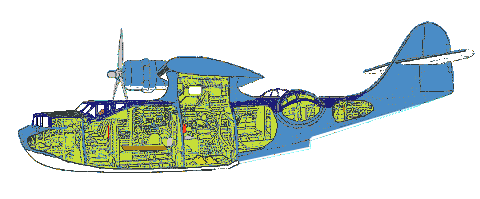
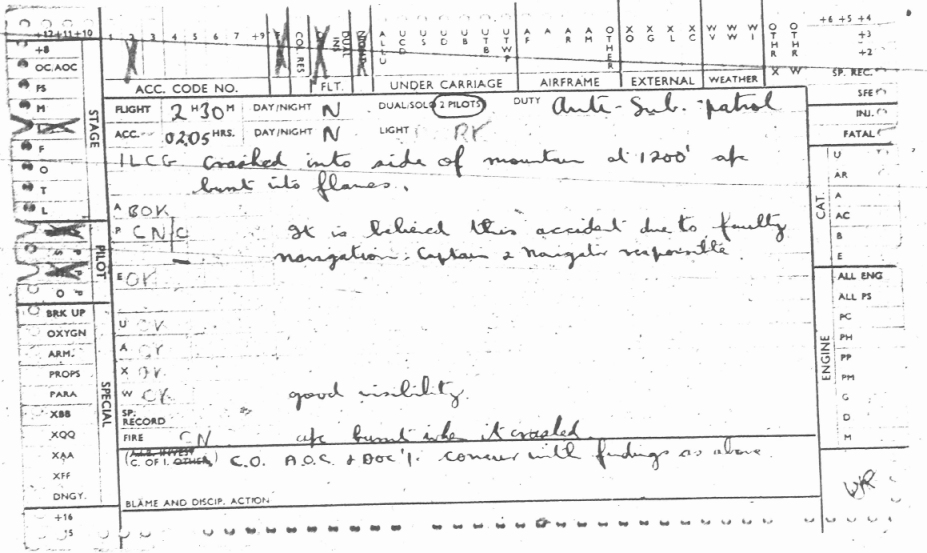
The rear of the sheet contains the findings of the
investigations carried out.
The time of the crash is given as 0205 hrs after a 2hr 30min
flight at night. The aircraft was on an anti sub patrol. It was
found to have 'Crashed into side of mountain at 1200' a/c
burst into flames. With little else to go on the RAF
officers conducting the investigation concluded simply: It
is believed this accident due to faulty navigation. Captain
and navigator responsible.. Weather conditions were
reported to give good visibility. The evidence contained in the
Irish Army report indicates that those locals who were spoken
too about the crash thought that the engines on the aircraft
were in some kind of trouble. There is some evidence in the
files that the witness statements taken in Stradbally were
forwarded on to the RAF in Northern Ireland. Also, a note in the
file also says that permission was given for Wing Commander Kay
and F/Lt Moore of the RAF to visit the crash site sometime after
the 29th of December.

